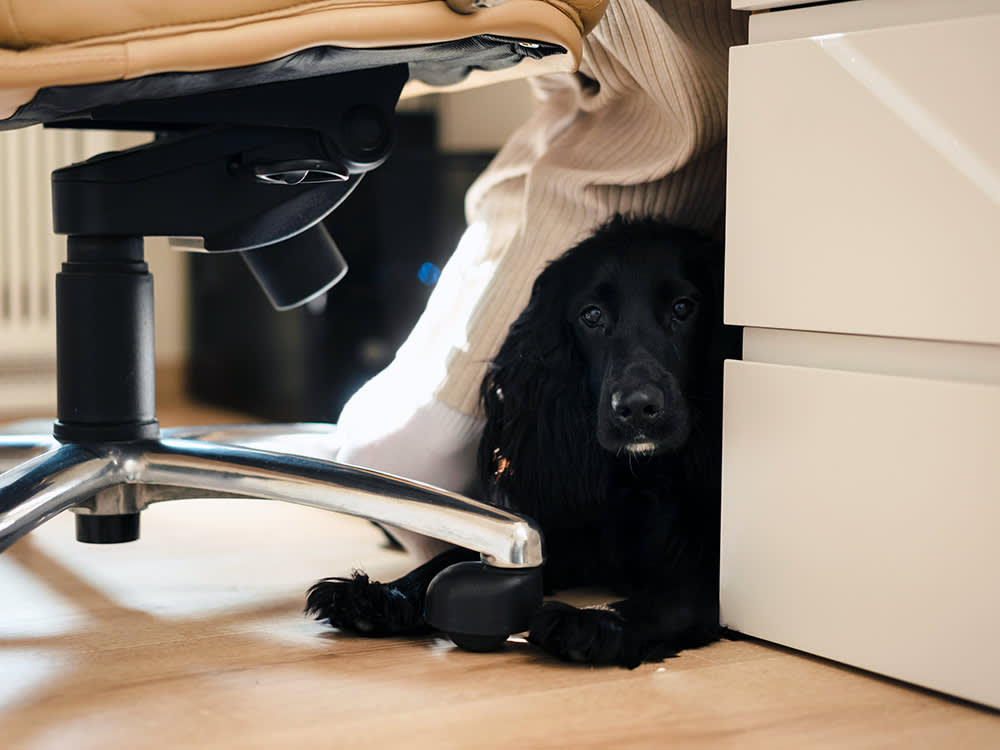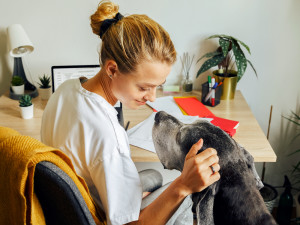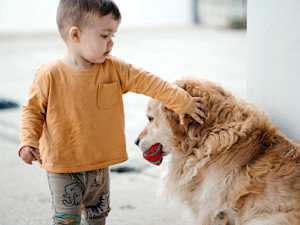Why Do Dogs Lie on Your Feet?
Not that anyone’s complaining...

Share Article
One of the best feelings in the world is your dog snuggling up to you, whether you’re relaxing watching TV or stretched out in bed. But sometimes dogs seem more interested in cosying up to your feet instead of settling in by your side for strokes. Should you be worried if your pup settles all their weight on your feet?
The short answer: no. It’s perfectly normal for dogs to lie on their human parents’ feet for a number of reasons, some of which go all the way back to their wolf ancestry. Your dog may be feeling nervous, acting affectionate, or simply trying to steal some of your warmth. Kinship answers the question “Why does a dog sit on your foot?” and whether this behaviour is ever a cause for concern.

littleKin™ is Kinship’s home just for puppy and kitten parents. Bop over to check out expert advice, new pet tools, and special deals—all curated for your newest family member.
opens in a new tabFive reasons your dog lies at your feet
Dogs are pack animals, and snuggling up to members of their pack (eg, you) is normal behaviour, although there are many reasons dogs sleep at your feet, from a sense of emotional connectionopens in a new tab to a bid for comfort. Dogs like to stay as close as possible to their loved ones and researchopens in a new tab shows that they see their parents in the same way a human child does. That’s right, your dog definitely thinks of you as Mum or Dad – someone who provides love, shelter and (maybe most importantly) food.
So, why do dogs like to lie on your feet? Below are the five most common reasons for this behaviour.
Affection
Humans sometimes show affection by snuggling up, and your dog may be doing the same thing. Dogs have evolved over time to have higher levels of oxytocinopens in a new tab (known as the ‘love hormone’), which encourages bonding and can be released during physical closeness. In short, your dog is genetically predisposed to bond with you and feel affection toward you.
Security
Your dog likely feels safe around you, which they may demonstrate by sitting on your feet and gazing up at you with those big, adoring eyes. Because they feel secure and comfortable around you, they’re more able to relax and may do so by lying on your feet. It’s your dog’s way of saying, “This is my special person.”
Warmth
As charming as dogs can be when they’re feeling affectionate, sometimes they lie on your feet simply to take advantage of your body heat. Compared to other animals, dogs don’t have as much body fat to keep them warm and their bodies radiate heat more quickly than those of humans. While your dog certainly loves you, they may also lie on your feet to use you as a convenient heating pad. If you notice your dog shivering regularly in the colder months, consider buying them a jacket or sweater.
Dominance
In some cases, dogs sit or lie on their human parents’ feet to show exactly who’s in charge or to let everyone else know that you belong to them. If your dog has a tendency towards showing a bit of an attitude, they may lie on your feet as a sign of dominance.
Resource guarding
Dogs have an innate instinct to protect their resources that goes back to their wild ancestors. For modern dogs, this can translate to guarding their resourcesopens in a new tab (aka you) from other pets or family members. Usually, this behaviour is accompanied by defensive actions like growling, snapping or even lunging at anyone who comes near, so watch out for signs of aggression.
Do dogs lie on your feet to claim territory?
Why do dogs put their head on your feet? Part of the pack mentality is protecting other members of the pack, so your dog may lie on your feet to guard you and claim you as theirs. If your dog sits on your feet in public spaces, like the local park, this could definitely be a sign of your dog marking territory. Fortunately, this behaviour isn’t really an issue unless you have multiple dogs in your home. If your pups fight over who gets to sit closest to you or lie on your feet, you may need to consult a dog behaviourist to avoid aggression leading to injury.
Should I encourage or discourage this behaviour?
In most cases, your dog snuggling up to your feet is a sign of affection and trust, not a cause for concern. Enjoy the cosiness of your dog sitting on your feet and recognise it as a sign of how deep your bond really is.
However, if your dog is always underfoot, this behaviour can become a bit of a nuisance. You can use positive reinforcement to discourage your dog from sitting or lying on your feet and train them to sit a little farther away with the use of treats and praise.
What does it mean if my dog sleeps at my feet?
Lying on your feet is one thing, but why do dogs sleep at your feet? If your dog sleeps at your feet in bed at night, they’re likely seeking support and comfort from your presence. Or they’re trying to soak up your body heat to stay warm. Either way, having a dog snuggled up to you while you sleepopens in a new tab can be a heart-warming feeling and a sign that they trust you and feel safe when you’re nearby.
Frequently asked questions
Do dogs lie at anyone’s feet or just their parents’?
Dogs tend to lie at the feet of those they trust deeply and love, so they usually engage in this behaviour with their human parents. If your dog spends a lot of time with a family member or friend, like a pet sitter, they may engage in this behaviour with that person as well.
Can this behaviour change over time?
When a dog is new to your home, they may keep their distance until they feel comfortable. Once they become more attached to you, your dog may begin lying on your feet more regularly. And some dogs may simply not show affection in this way or do so only sporadically.
Should I be concerned if my dog suddenly starts lying on my feet a lot?
If your dog begins lying on your feet more often, they’re most likely growing more attached to you, which is definitely a good sign! However, if your pet also exhibits signs of anxiety or fear, there may be a deeper issue that you should discuss with your vet.
Resources

Savannah Admire
Savannah Admire is a writer, poet, and pet mom to three dogs and a cat. She currently lives in Western Maryland. When she’s not writing, you can find her reading, taking photos, or volunteering as a content creator for her local community theatre. Her debut poetry book, Mother Viper, is due out August 12, 2025, and you can follow her on Instagram at @savannahcooperpoetopens in a new tab.
Related articles
![Black dog sitting on tiled floor]() opens in a new tab
opens in a new tabWhat’s Better Than a Tail Wag? A Circle Wag
Also called the ‘propeller wag’ or ‘helicopter tail’, this behaviour is a surefire way to tell that a dog is happy
![Dog looking out a window in the winter]() opens in a new tab
opens in a new tabCan Your Dog Suffer From Seasonal Depression?
Here’s why dogs may suffer from seasonal affective disorder, too
![Young woman sitting at desk petting her senior Great Dane]() opens in a new tab
opens in a new tabHow to Speak ‘Dog’
Lili Chin’s book, Doggie Language, illustrates how dogs communicate – beyond ear perks and tail wags
![Close up shot of a brown dog sniffing upward out of frame with blurry grass in background]() opens in a new tab
opens in a new tabCrotch Sniffing: Crude Or Customary?
Is it time to teach your dog some boundaries?
![toddler boy bothering dog with ball in mouth]() opens in a new tab
opens in a new tabHow To Help Your Dog Deal With A Toddler In The Wild
Unsolicited approaches from children can’t always be predicted
![Afghan hound dog mid jump in an open grass field]() opens in a new tab
opens in a new tabOverexcited Dog? How to Calm A Dog Down
If your dog loses their sh*t over anything from a squirrel to a visitor, dog behaviourist Trish King has some tips








